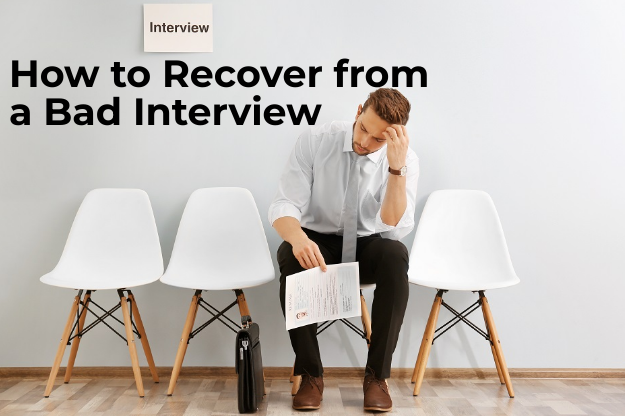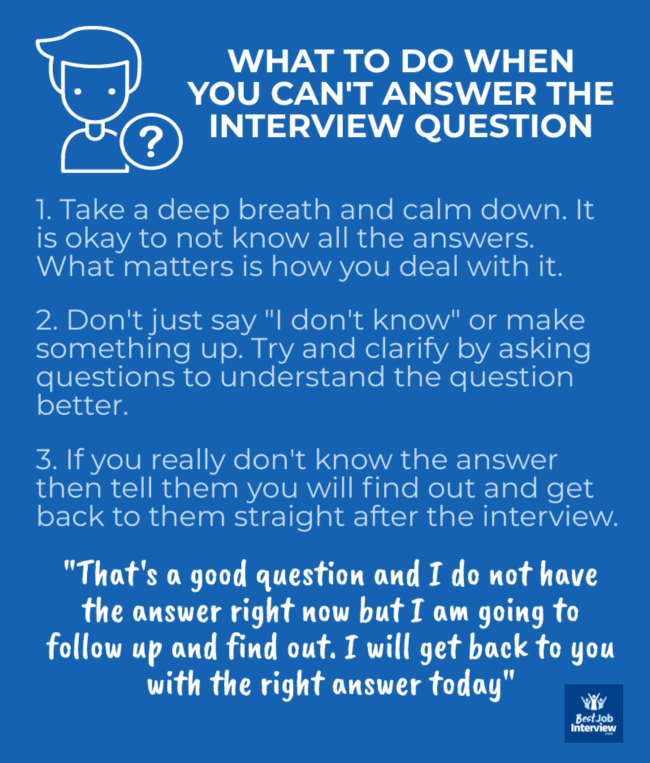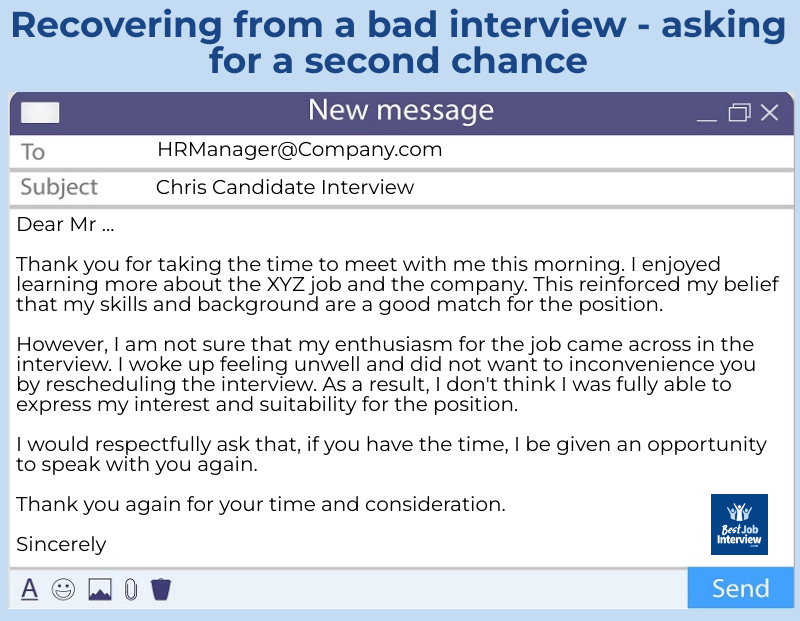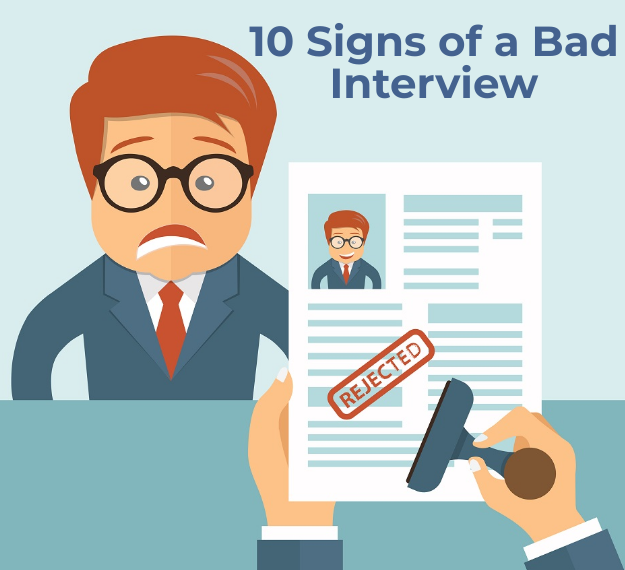[ad_1]
Recovering from a bad interview is possible. Find out
- how to recover during the interview when things are going badly
- what to do after a bad job interview

5 ways of recovering from a bad interview
Interviews are stressful. No matter how well prepared you are things can
go wrong. If you think things are going badly during your interview, here are 5 ways to get it back on track.
1. Damage control after a bad interview answer
If
the interviewer appears confused or dissatisfied with an interview
answer, you can check if you have understood the question correctly by
asking for further clarification. This will also give you some time to
think about a more precise answer.
“Would you like me to tell you about ….”
“Are you asking about….”
Once you have determined what the interviewer is looking for in your answer, politely respond again.
“I am sorry, I did not fully understand your question. I can now provide a more specific answer…..”
2. How to recover when you don’t know the answer to an interview question
First,
ask the interviewer to rephrase the question. You may be able to answer
if you gain a better understanding of the question itself.
There
may be certain difficult questions that you just cannot answer in the
job interview. This does happen but how you deal with it is important in
recovering from a bad interview.
Use the example below to help you with this.

3. Avoid dwelling on a slip-up
Don’t let one upset ruin your interview. One poor interview answer is unlikely to completely ruin your chances.
Get you mind back in the game. Dwelling on an inadequate answer will cause you to appear distracted for the rest of the interview and you will be unable to focus on recovering and doing your best.
4. Ask some insightful questions
If you feel the interview is going badly, one way to regain some control is to ask a couple of smart questions of your own. This also serves the purpose of taking the interview in a direction you feel more confident about.
“What sort of problems am I likely to face in this position?”
“What would be the most important competencies for success in this role?”
Candidates may feel that they have lost the interest of the interviewer who appears bored. Often an interviewer is conducting multiple interviews in a day and is just tired. Try to engage the interviewer’s interest by asking a direct question such as:
“Why do you enjoy working here?’
“What have you found to be the most important qualities for someone working at this company?”
5. Share some additional information about yourself
You can highlight some of your areas of suitability if you feel this has not been adequately explored during the interview.
“One of the reasons I applied for this position is because my XYZ qualification has provided me with a solid knowledge of marketing practices and principals”
A strong interview closing is key in recovering from a bad interview.
Recovering from a bad interview – 5 steps to take after the interview
So you think you’ve blown the interview, what now? You can’t redo the interview but there are some things you can
do after a bad job interview to repair the employer’s impression of you.
You can take these steps for post-interview damage control and give yourself a fair chance of recovering from a bad interview.
1. Take time to reflect on the interview
First think about what went well in the interview. It helps you to feel less negative about the situation. Also, you can highlight these areas in your follow up email and remind the interviewer of your strong points.
Then identify the areas you feel went badly. Avoid over analyzing every little thing and dwelling on small slip-ups. These probably did not have a big impact on the outcome of your interview. Focus on obvious areas of concern.
Once you have determined the important areas you need to address, you can develop a plan of action.
Mistakes that can be addressed after the interview include:
- Important information that you left out during the interview and is relevant to your suitability for the job
- Important details that you were unable to provide at the time because you did not have the information to hand
2. Use your thank you email to gracefully and succinctly do damage control
Essential information can be provided, concisely and clearly, in a follow up email. You should avoid lengthy explanations and convey the information in a couple of sentences.
Thank the interviewer for his or her time and then move on to the important information you want to share. “I was particularly excited about the aspect of this role. I should also mention that ….”
Avoid apologizing for a bad interview, just thank the interviewer, provide the necessary information and reinforce your suitability. Often the interview did not go as badly as candidates may think and apologizing may only draw attention to the negatives.
3. Contact your references
You can contact your references, tell them about the interview and that they may be contacted by the employer. Ask them to fill in any gaps that you feel were missed in the interview and that are important in determining your suitability for the job.
4. Learn from your mistakes
Recovering from a bad interview involves understanding why it went wrong and making sure it doesn’t happen again. Even if you cannot salvage this particular job interview there are things you can do to get some value from it.
Consider the cause of the problems in the interview. These are the 7 top reasons for bad interviews.
Work out a plan of action to improve on these areas before your next job interview.
How to avoid interview mistakes
5. Move on
Keep in mind this is just one job interview and you will do better next time. Recovering from a bad interview means doing what you can to fix it, learning from your mistakes and putting it behind you.
Should you ask for a second chance?
If you feel that this is a job you really want, that you are the right person for the job and there was a valid reason for the bad interview, you may want to ask for another interview.
For example if you were feeling unwell or impacted by a serious life event, you can send an email thanking the interviewer and briefly explaining why your interview performance was compromised. Then ask if there is a possibility of another meeting.
Employers understand that candidates can have bad days or certain issues can derail a candidate’s performance in the interview, and may be prepared to give you a second chance.
This sample email can be used for this sort of situation.

What are the signs of bad interview?
How do you know the interview really did go badly? These are the 10 signs of a bad interview.
How to handle job rejection
If you do get rejected for the position, find out how to handle it and successfully move on with your job search.
[ad_2]
